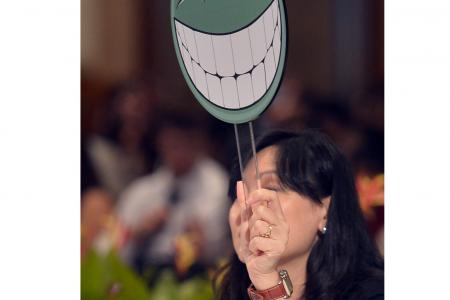Secrets to being happy from 'Singapore's happiest person'
It’s International Happiness Day. S’pore is ranked 22nd happiest country in the world in one survey. But are we happy?
Are we happy in Singapore?
Depending on which poll or index you refer to, we can be pretty schizophrenic, veering dramatically between happy and unhappy.
For instance, Singapore was recently ranked 22nd out of 157 countries in the World Happiness Index 2016. (We pipped the UK. But lost out to Mexico. And it makes us the happiest country in the region too.)
But we were 90th out of 151 countries in the Happy Planet Index (HPI) just last year.
And to top it all off, we could be neither happy or unhappy as a Gallup poll in 2012 ranked us as the least emotional country in the world.
Gallup asked residents whether they experienced five positive and five negative emotions a lot the previous day, the latter being anger, stress, sadness, physical pain, and worry.
Positive emotions were feeling well-rested, being treated with respect, enjoyment, smiling and laughing a lot, and learning or doing something interesting.
Only 36 per cent of Singaporeans surveyed said they felt something.
So The New Paper on Sunday spoke to Dr Daniel Goh, Associate Professor and Deputy Head of Sociology at the National University of Singapore, to help us with the conundrum.
He explains that some global survey questions could have a cultural bias, and are likely based on American values, rather than a measurement of universal happiness.
For instance, smiling may be taken as an expression of friendliness, not happiness.
"Therefore, it is an inaccurate measure of happiness," he explains.
On the other hand, the HPI measures a "happy planet" and not a "happy society".
It measures how much resources the nation is consuming and pollution it is producing in order to achieve happiness.
He says: "Singapore is a happy nation with a terrible ecological footprint, which means we are consuming a lot of resources and emitting a lot of pollution in order to achieve our happiness.
"It doesn't negate the fact that we are happy. We are just high-maintenance happy people in terms of our ecological demand on the Earth."
As for Gallup's Global Emotions Report in 2012, Dr Goh attributes Singaporeans' lack of emotions to how we are a hyper-rational society.
"Singaporeans are super hard workers, which can be sometimes detrimental to our own emotional well-being," he said.
"We work long hours and strive for efficiency, applying ourselves to our jobs with seriousness and rationality, with little emotion."
But that is not to say that we are unhappy.
Conversely, Singaporeans seem to get pleasure from a job well done.
Explains Dr Goh: "When the job gets done and done well, at the end of the work day, we are happy."
COMPLAIN, COMPLAIN
Another trigger for happiness in a Singaporean?
Complaining, says Dr Goh, who has researched happiness here.
Singaporeans derive much satisfaction from the activity of complaining, he explains.
The good thing that came out from being labelled emotionless was the civic response it prompted, says Dr William Wan, general secretary of the Singapore Kindness Movement.
He says many campaigns were launched in response.
"I would like to think that all of our campaigns and ground-up movements, which are aimed at inspiring kindness and graciousness in people, have contributed to happiness in some way or another," he says.
Local telco StarHub mounted a social movement aimed at encouraging Singaporeans to spread happiness through little acts of kindness, and sharing what happiness means to them.
The campaign received numerous entries on social media says Mr Howie Lau, Chief Marketing Officer for StarHub.
"Amid the buzz that the initial Gallup survey triggered, we are happy to have contributed in our own special way to help encourage positivity in Singapore," says Mr Lau.
We asked some Singaporeans if they are a happy bunch
I believe that we are very happy people but we are often pressured to perform well; as a result we are stressed out. It diminishes our level of happiness as a whole.
- Miss Nurezwani, 19, a Ngee Ann Polytechnic student
There aren't protests and unemployment is low. All these indicate a happy nation.
- Mr Joseph Tan, 50, a self-employed businessman
Singaporeans are honestly too caught up with the flow of 'catching up'. Catching up with our peers, regional or global standards... We are always too busy catching up to experience happiness.
- Miss Jayne Boey, 28, a paralegal
'S'pore's happiest person' focuses on the good

Engineer Andy Goh made headlines eight years ago when he was named Singapore's Happiest Person.
When The New Paper on Sunday catches up with him, the 43-year-old is still bubbling with mirth as he confirms he's as happy as ever.
He punctuates this interview with frequent chortles and says: "I am generally an optimistic person.
"I acknowledge problems, but I choose to ignore issues I can't make a difference to, such as wars and poverty.
"No matter how much you worry, there is nothing you can do. I would be getting myself down for nothing."
Mr Goh's sister-in-law, Ms Samantha Chan, 37, explains what sets Mr Goh apart: "Andy is a very good-natured person. I have never seen him getting all angry and grouchy over things that people say or do.
"He has a lot of positive energy and he is the life of the party, often seen laughing or cracking jokes."
Ms Chan, a civil servant, added: "The energy and vibe that he gives off just attracts people. He doesn't hide his enthusiasm, unlike typical Singaporeans, who are generally more reserved."
All those years ago, Mr Goh participated in a competition to find "Singapore's Happiest Person", organised by a training consultancy.
The contest called for written nominations, between 300 and 1,000 words, explaining why the candidate was a 'model of happiness'.
It attracted a surprising 208 candidates, and Mr Goh pipped them all with his prescription for finding happiness: "Look not too far, as it's probably already close to you."
Since then, his story has drawn a welter of negativity online.
And it's something the father of two takes in his stride.
For instance, winning the competition meant he won a stay at a luxury resort in Phuket. Netizens had a field day attributing his happiness to the luxury prize he'd won.
Mr Goh pooh-poohs that idea, noting that he had to fork out for flight tickets, so there was no monetary gain to be had.
THANKFUL
He says: "I am thankful for what I have - good health, a happy family, a safe place to live in.
"Focusing on the good gives me the energy to do the things I have to do."
When asked if he has made a conscious effort to teach his kids happiness, he says he hasn't.
"I think it rubs off on them. I teach them to be thankful, like if they get an ice-cream, just be glad that you have one and not hope for two ice-creams."
While he acknowledges that he has the material trappings that people say contribute to happiness, Mr Goh points out:
"Well, they can look at it the other way around. Nobody owes anyone a living.
"I wasn't born with a car and a job. What you make out of your own life is on your own.
"So if you want something, set out to achieve it.
"If you are unable to, due to some unforeseen circumstances, then do not focus on what you don't have but rather, on what you already have."
Celebrating happiness
The International Day of Happiness was adopted through a United Nations resolution in June 2012.
The resolution acknowledged happiness as a "fundamental human goal" and called for "a more inclusive, equitable and balanced approach to economic growth that promotes the happiness and well-being of all peoples".
In 2013, the first Happiness Day was commemorated by celebrating "Happy Heroes" - or people who bring happiness to others in their communities.
London had happy flash mobs, Hong Kong did laughter yoga, and Bhutan had a meditation session to celebrate the day.
Get The New Paper on your phone with the free TNP app. Download from the Apple App Store or Google Play Store now



